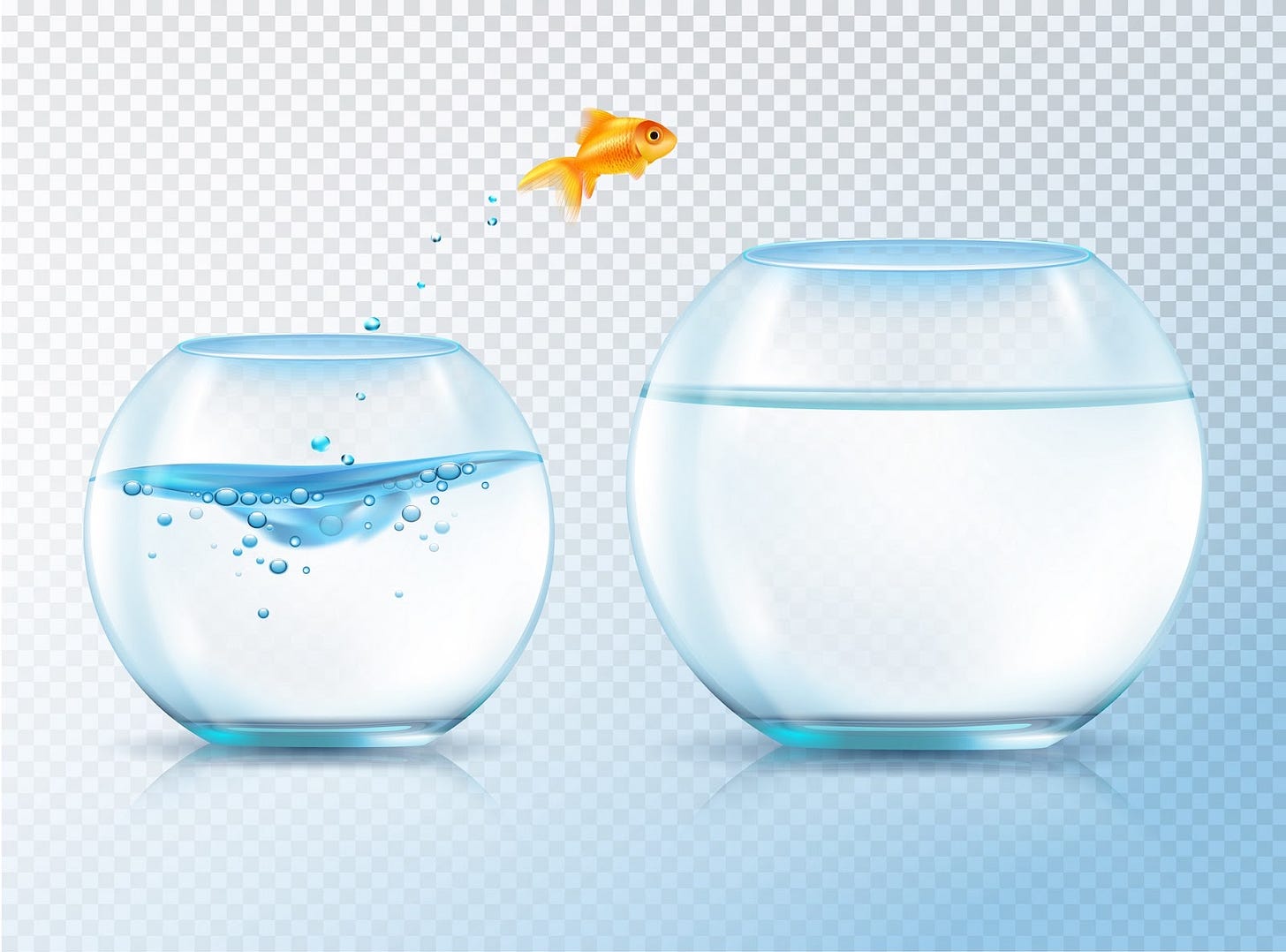Introduction
Swami Vivekananda famously employed extreme methods such as fasting, meditation, and, as some anecdotes suggest, sitting on hot surfaces to discipline his body and mind. These practices reflected his commitment to overcoming desires through sheer willpower. While most of us aren’t wrestling with the kind of spiritual intensity that involves fasting or sitting on hot surfaces, we do face a steady stream of modern temptations, the pull to compare, consume, or to prove ourselves. Whether it’s keeping up with friends’ accomplishments, buying things we don’t need, or constantly seeking validation online, temptation shows up in sneakier, subtler ways.
Fortunately, resisting all this doesn’t require renouncing the world or going full monk mode. We don’t need to sit on hot surfaces to withstand the urge to keep up with the Joneses, or chase success that isn’t truly ours. While I'm no swami, I always fight this battle by deliberately focusing on my own values and aspirations, anchoring myself to what truly matters for my life. This isn't a prescriptive guide on how you should live, but rather a journal sharing how I navigate these challenges in my own life.
Why We Feel the Need to Keep Up
We live in a society deeply connected to our friends and family. Many of them find success in their own ways: some focus on climbing the corporate ladder, while others acquire properties or pursue side gigs for a second income. This creates a constant, unspoken pressure to match, if not surpass, our friends by excelling in acquiring assets or titles. It is a modern echo of the ancient myth of Icarus.
Icarus, given wings made of feathers and wax by his father Daedalus, was warned not to fly too high as the sun would melt the wax and not to fly too low (the sea would ruin the feathers). But once he took flight, the thrill got to him and he flew higher and higher, tempted by freedom, power, or maybe just the feeling of being untouchable. His wax wings melted, and he plunged into the sea.
Source: https://en.wikipedia.org/wiki/File:Gowy-icaro-prado.jpg
What we often fail to realize is that each person has a unique story and goals, tailored specifically to their own lives. Chasing aspirations that aren't genuinely meaningful to us only leads to mental exhaustion. This constant comparison, especially amplified by social media, can leave us feeling inadequate, foster low self-esteem, and even breed resentment towards our closest friends. Instead of genuinely celebrating their successes, we might secretly strategize on how to "do better" ourselves.
Financially, this urge to keep up can lead us to overspend on appearances rather than genuine needs, trapping us in a cycle of debt and dissatisfaction. Ultimately, trying to outdo our peers harms us both mentally and physically, diminishing our well-being in the process.
The Hidden Costs of Comparison
I often hike a trail near my home, sharing the path with many others, mostly in small groups. While some are connecting with friends and others are pushing for a personal best, there's a curious human tendency I've noticed: comparison. Whether it's tagging a few folks to see if they catch up or striving to pass someone ahead, we often fall into this subtle competition.
But why? What's the point of trying to "beat" someone else simply by gaining a few steps? Each person on that trail has their own reasons for being there, and those reasons likely have nothing to do with your personal goals. Yet, we compare. And that's where the hidden cost lies. While hiking is just one example, this principle applies to other facets of life. So, how does one avoid comparison?
Being authentic and content will certainly help us avoid comparison. Authenticity means being true to yourself, your beliefs, and your unique path, rather than conforming to external pressures or others' expectations. If you value authenticity, you're less likely to pretend to be someone you're not or acquire things you don't genuinely need. It helps you stay grounded and not hallucinate (yes, I had to bring in the LLMs!) about who you should be, but rather focus on who you already are. Similarly, valuing contentment means finding satisfaction and appreciating what you already have. Recent discussions in the Valley highlight how Meta is reportedly offering $200 million to some of the top AI researchers. That's a lot of money, and I wouldn't think twice if someone offered me that. But I'm happy with my current state after fighting all these years to cultivate an "enough" mindset.
Practical Strategies for Contentment
Resisting temptation is a universal challenge, and there's no single, simple solution. However, a combination of strategies from psychology, philosophy, and mindfulness can be very effective. The key is to move beyond relying solely on "willpower" and to instead build a more robust system of self-control.
Finding your Ikigai
I’ve often been told, “You never seem to get bored working.” Honestly, my kids are baffled that I'm genuinely happy doing what I do. The truth is, it rarely feels like work. For me, the only time I’m not engrossed in something I love is when I’m sleeping. The rest of my waking hours are spent thinking about or actively working on passions that began when computer science was still new.
I remember my dad bringing home a personal computer, which he used for accounting. I, on the other hand, was busy learning Basic and mastering Dig Dug. That fascination, sparked more than 30 years ago, has only grown. The field has evolved dramatically, and I’ve been fortunate to evolve with it, continuously learning new things and building products that genuinely impact others' lives.
I truly sympathize with those who eagerly countdown the hours to the weekend, seeking a break from a routine job to finally pursue what they're passionate about. But what if your "work" was your passion? What if you could resist the temptation of discontentment and the constant yearning for an escape?
For me, the key has been finding something I deeply enjoy and, luckily, getting paid to do it. The best thing you can do for yourself is discover that sweet spot where your talents, passions, and purpose align. This brings us to an important question: What is your Ikigai? and you can read more about it in my earlier post.
Odysseus Rule
The Odysseus rule also known as the Ulysses pact is a powerful, scientifically-backed strategy for fighting temptations. It is a strategy where an individual creates a self-imposed constraint or limitation to avoid a future temptation or negative outcome. It draws inspiration from Homer's Odyssey, where Odysseus famously has himself tied to the mast of his ship to resist the irresistible song of the Sirens. By creating this barrier, he ensures he can hear the alluring song without succumbing to its deadly call.
Source: Ulysses and the Sirens, painting by John William Waterhouse
This concept has applications in various aspects of life, including personal finance, health, and productivity, where individuals might use it to stick to a budget, maintain a diet, or avoid distractions while working. Pre-paying a gym membership or buying one of those expensive Peloton bikes will ensure you will stay motivated to workout. Some of us buy homes with large mortgages so that they are not left with any cash to splurge lavishly. We are implicitly acknowledging that our future self might be tempted to spend money unwisely. Hence, we are tying ourselves “to the mast” like Odysseus.
Mindfulness
I signed up for a Transcendental Meditation course last year after thinking about it for quite some time. The course was good, and the teacher was thoughtful, but I still struggle to make meditation a daily habit. I could come up with a list of excuses, but the truth is, I always feel calmer and more centered after every session. Thanks to the instructor, I now join a small group over Zoom on weekends, and that rhythm has helped keep me loosely on track.
What mindfulness has really given me is the ability to observe my thoughts and emotions without jumping into action. Temptation often shows up as a passing feeling or a stray thought. Rather than reacting right away, I’ve learned to pause and reflect. That short pause creates space to respond in a way that aligns with what matters to me. A simple example is investing. The market is full of noise, hype, and herd behavior. The temptation to jump in is strong, especially when a hot IPO makes the rounds. But instead of reacting, I try to take a step back and ask whether the move fits into my long-term goals. Sometimes it still makes sense to invest. Other times, I walk away without second-guessing. That pause makes all the difference.
Enough Mindset
There was a post on LinkedIn that someone in my network had liked. The author talked about meeting people who do physically demanding jobs in harsh conditions. He shared that he often gives them a hundred dollars just like that. That mindset really resonated with me. I try to do the same whenever we travel. If I come across someone who is working hard for very little, I help when I can.
People often assume that kind of generosity comes from being wealthy. But what does that really mean? One person’s definition of “rich” could be having a few million saved. Another might say you need ten, especially once you factor in things like healthcare and retirement. The goalpost keeps moving. And if you're not careful, you end up chasing a number you can never quite reach.
Over time, I’ve realized that wealth isn’t just about what you have but it’s about how you relate to what you have. For me, cultivating a mindset of enough has been key. It’s what allows me to give freely, spend wisely, and resist the endless temptations to upgrade, compare, or accumulate more for the sake of more.
Conclusion: Breaking Free from the Cycle
I was tempted to write yet another blog on AI. Of the handful of readers who follow my blog, one close friend reminded me that it has been a while since I wrote a non-tech post. This one had been lingering in my mind for a while, and that gentle push gave me the reason to finally put it down.
Resisting temptation isn’t always about saying no to something harmful. Sometimes, it means turning away from something thrilling but unsustainable. Icarus didn’t fall because he lacked wings. He fell because he could not resist flying too close to the sun.
Recently, there was news about an AI researcher who reportedly turned down a billion dollar offer from Meta. I do not know the full story, but it sounds like that person has figured out something deeper about life that I am still trying to understand. We all face moments when we are tempted to take shortcuts or chase shiny things that do not quite align with who we are or what we value. In those moments, the real test is not whether we can overpower the temptation, but whether we can pause long enough to remember what truly matters.
Odysseus tied himself to the mast to resist the Sirens. I rely on weekend TM sessions, a slowly growing sense of enough, and the ongoing search for Ikigai. Different tools, but the same goal: to resist temptations.






